News
STA, 6 November 2018 - The opposition Democrats (Slovenska demokratska stranka - SDS) have requested an extraordinary session of the National Assembly to debate the UN-sponsored global compact for migration. MP Branko Grims said Tuesday the party demands the Slovenian government reject the agreement in its entirety.
The SDS is against the Global Compact for Safe, Orderly and Regular Migration because "it treats all migrants in the same way, and eliminates state borders in the long-term".
The party fears the agreement would present a burden for Slovenia in terms of finances and in general, and would result in a downfall of Slovenia as well as other European countries, according to Grims.
He stressed that an increasing number of countries had already withdrawn from it, including the US and three of Slovenia's four neighbours.
See our guide to Slovenia’s main political parties here
Saying that the agreement is not binding on Slovenia is misleading, according to Grims. While it is true that parties to it are not legally bound by the deal, they are bound by it politically, he stressed.
Signatures for the request of the parliamentary session were contributed by another two opposition parties, New Slovenia (NSi) and the National Party (SNS).
Jožef Horvat, who heads the NSi's deputy group, told the press the government should not support the deal because it does not address the issue of how to eliminate the causes of migrations.
The NSi would like the National Assembly to pass a resolution recommending that the government "encourage seeking within EU and UN institutions a solution to eliminate the causes of migrations in source countries".
Slovenia had endorsed the drafting of the agreement, but the Foreign Ministry stressed on Monday that it was not binding and that it gave countries' sovereignty to shape their own migration policies.
The document, the first international agreement on migration management aimed at improving cooperation on this issue, will be adopted in Marrakesh, Morocco, next month.
See all our stories on immigration in Slovenia here
Below is a review of today’s news in Slovenia, summarised by the headlines in the daily newspapers for Wednesday, November 7, 2018, as prepared by the STA:
DELO
Real estate tax
"Who will be squeezed by real estate tax?": While the Catholic Church in Slovenia is among those hoping to avoid the pending real estate tax, a European Human Rights Court decision exploded in Italy yesterday that tasks the state with collecting unpaid real estate tax from the Church for the 2006-2011 period. (front page, 3)
Radan trial
"Hard to prove manslaughter without a body": The presiding judge criticised the prosecution as Ivan Radan, a neurologist charged with killing four terminally ill patients with lethal injections, was acquitted. The judge stressed that the presumption of innocence reigns supreme. The prosecution announced an appeal. (front page, 2)
Local elections
"Asphalted road leads to mayoral office": Asphalt production is up by a third ahead of the local elections, the paper points out. (front page, 2)
DNEVNIK
Radan trial
"Ivan Radan walks free": Neurologist Ivan Radan was acquitted after an almost three-year trial. The presiding judge levelled strong criticism against the prosecution. (front page, 2, 3)
UN migration deal
"Šarec passes on hot potato to Cerar": The paper points out that the Slovenian prime minister will not be among those who will be signing the historic UN pact on migration in Marakhesh next month. Foreign Minister Miro Cerar is not in favour of Slovenia withdrawing from the deal, he however feels the country should recalibrate its stance. (front page, 4)
FINANCE
Consumer loans
"Slovenians go crazy with consumer loans": Speaking of a recipe for disaster, the paper echoes the warning of the central bank and points out that consumer loans have reached the level they were at just before the crisis. (front page, 2, 3)
Selling trend
"Which wealthy Slovenians have recently sold one of their companies?": Finance says that the trend of wealthy Slovenians offloading their companies, which started in 2015, is continuing this year. (front page, 5)
Gorenjska Banka takeover
"Things running smoothly for Kostić, he can take over Gorenjka Banka now": The Slovenian central bank has given the green light for the takeover of Gorenjska Banka, which will allow Serbian businessman Milodrag Kostič to further expand his portfolio in Slovenia. (front page, 5)
VEČER
NLB sale
"The worries of small shareholders": The paper has been checking small investors' interest in NLB shares at the bank's branch offices, finding it is rather modest. (front page, 2, 3)
Radan trial
"Judge acquits Radan": While the court acquitted former Ljubljana UKC doctor Ivan Radan of manslaughter charges, the presiding judge issued the prosecution with a lengthy reprimand. (front page, 20, 21)
Dividends payout at TAB
"Handful of shareholders get even richer": The AGM of vehicle and stationary battery maker TAB decided to pay out EUR 15.5m or EUR 60 gross per share in dividends. (front page, 6)
STA, 6 November 2018 - Ivan Radan, a neurologist charged with killing four terminally ill patients with lethal injections, was acquitted as a trial that lasted almost three years concluded at the Ljubljana District Court on Tuesday.
Radan had been charged with manslaughter as well as abuse of medical prescriptions, illegal video recording of dying patients and forgery of sick leave notes, crimes for which he faced 20 years in prison. He was found not guilty on all charges.
The presiding judge, Martin Jančar, issued a stern rebuke of the prosecution as he delivered the verdict as he said the prosecutor had focused on the suspect's personal circumstances.
Facts matter, not personality
"If a person is a liar, addict or has a personality disorder ... this does not mean that he is also a murderer," he said.
And because the prosecution focused on Radan's personality, it overlooked the facts of the matter. "The court must presume innocence, it may not presume guilt," he said.
The judge also said the prosecutor, Katarina Bergant, had been indiscriminate in attempting to discredit one of the key expert opinions, by the Austrian forensic expert Wolfgang Kröll.
Kröll was a key witness in the trial and he was unable to confirm that Radan was responsible for his patients' deaths, and indeed the court invoked Kröll's opinion in declaring Radan not guilty.
The court also highlighted the absence of material evidence and being unable to determine the cause of death of any of the suspected victims since they were not autopsied and were subsequently cremated, rendering exhumation impossible.
The judge stressed that patients who die in hospital must be autopsied unless it is determined that the cause of death is unquestionable.
Since death certificates were signed by Radan and several other doctors, this directly implies that they had determined the cause of death did not warrant further scrutiny.
No evidence of lethal injections
"The collected evidence does not allow the conclusion that [Radan] did in fact inject his patients with potassium, nor are there any other circumstances that would indicate he is guilty," the judge said.
The verdict caps almost three years of court proceedings in a landmark case that has been closely watched by medical experts and the lay public alike due to its severity.
Over 100 witnesses were heard by the court and multiple psychological assessments were carried out to determine whether Radan suffered from a god complex.
The goal was to determine whether Radan did in fact administer deadly cocktails of drugs, including lethal doses of potassium, to several terminally ill patients between 2012 and the end of 2014 as suspected.
He was initially charged with the murder of six patients but two charges were dropped due to a lack of evidence and the remaining four murder charges were reduced to manslaughter.
Radan has maintained his innocence throughout the trial, insisting that he only made it look as if he had administered lethal doses of drugs to terminally ill patients to draw attention to poor communication at the intensive care unit of the Ljubljana UKC Neurology Clinic.
In a statement after the verdict, Radan said "the judge said everything" and refused to provide any further comment.
His attorney Gorazd Fišer, asked if he was pleased with the verdict, said he would be pleased when the people finally recognise that "when in doubt, prosecutors indict and courts acquit," rather than expecting that every case will end with a guilty verdict.
Prosecutor Tamara Gregorčič, standing in for Katarina Bergant, argued the court had minimised witness testimony, which could have a chilling effect on witnesses in future trials.
"I think the judgement is not just and true," she said as she announced that the prosecution would lodge an appeal.
Related: Closing arguments made in bizarre trial of doctor accused of killing patients
If thinking about skin cancer then Australia doesn’t seem too surprising for the top spot in melanoma deaths across both sexes for the time period 2013 to 2015, being a sunny country with a strong beach culture and large population of pale skinned folk with genes that are better suited to Northern Europe. However, according to research presented on Sunday at the 2018 NCRI Cancer Conference in Glasgow , the #2 spot is more unexpected – Slovenia.
Related: Food, Alcohol, Sex, Marriage, Divorce & Death: Recent Statistics on Slovenia
The study, which examined cancer deaths in 33 developed countries in Europe, North America and Australasia, since they had the most reliable data, found that in Australia 5.72 male deaths were reported for every 100,000 men from 2013 to 2015, compared to 2.53 female deaths for every 100,000 women. In Slovenia the death rate among men was 3.86 per 100,000, while for women it was 2.58. The lowest death rates for melanoma were found in Japan, at 0.24 for men and 0.18 for women.
The report, published by the UK National Cancer Research Institute, can be read in full here (PDF), while the figures for all the countries included are summarized below. One notable finding about the data – more men die of skin cancer than women.
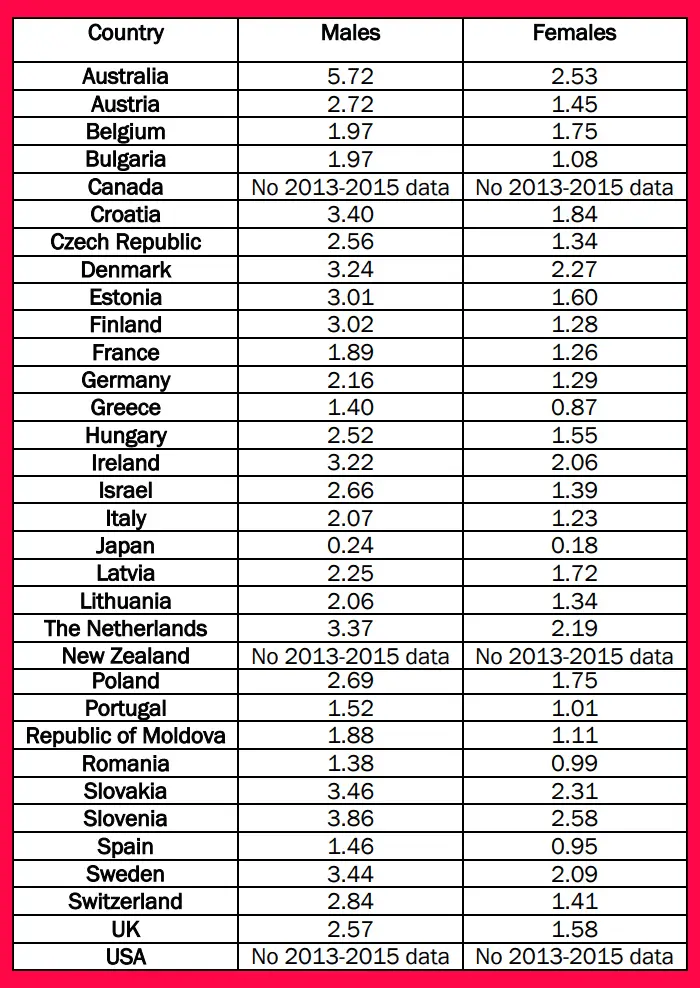
Data: UK National Cancer Research Institute
STA, 5 November 2018 - A study presented in the capital on Monday shows that apartments in Ljubljana are becoming increasingly out of reach for an average household due to several factors. The average age of apartments is increasing, as there are too few new housing projects, while the rental market is unregulated, the authors of the study warned.
Carried out by the Ljubljana Faculty of Social Sciences and the Institute of Spatial and Housing Policies, the survey is based on statistical data, an on-line survey and interviews with experts in real estate.
It shows that the average age of apartments is increasing and becoming inadequate considering the structure of the population, as the number of single or two-member households is going up due to the population ageing.
Despite this fact, the prices of apartments in Ljubljana continue to grow and apartments are becoming increasingly hard to afford.
According to the study, the prices are growing at a faster pace than wages, with the average prices increasing by 26% in the 2011-2017 period, and wages increasing only by 5%.
Špela Perner of the institute noted that in 2014, 84 average monthly wages were needed to buy a 50-square metre apartment in Ljubljana, with his number increasing to 101 in 2017.
Only 16% of the apartments in the capital were built after 1991 and an average resident of Ljubljana has less usable living space than the average Slovenian.
More than half of the 900 surveyed people would like to live in a different apartment, mostly because they believe their apartments are too small, they want to be independent from other household members, because they are too expensive or inadequate.
The study also shows that apartment construction significantly lags behind the growth of population. Between 2008 and 2017, the number of residents in Ljubljana was up by 15,500, while the number of apartments was up by 3,300.
16,000 too few apartments in Ljubljana
The authors have estimated that the apartment shortage in Ljubljana in 2025 will stand at 16,000, noting that the local authorities have not been investing enough funds in housing, even though they invested more than other municipalities do.
The number of non-profit apartments is also too low considering the number of people eligible, with the local authorities being forced to subsidise the leasing of such apartments at a 40% rate.
The authors have thus recommended to the Ljubljana Municipality to demand from the state to take certain measures, including additional taxation of empty apartments and stricter supervision of the rental market.
The municipality should earmark more funds for the construction of public non-profit apartments, support the development of housing cooperatives and prevent apartments becoming an investment, including by limiting short-term rentals to tourists.
Related: Analysis of Ljubljana’s real estate market sees bubble
The regional aviation website Eu-Yu Aviation reports that Adria Airways has quietly ended services connecting Ljubljana and Bucharest, Kiev and Warsaw. While no formal announcement was made, the airline omitted these cities in a recent press release, despite having advertised all three routes just two weeks ago in a seasonal promotion. Ljubljana Airport now has no direct flights to Bucharest or Kiev, although it’s still possible to fly to and from Warsaw using LOT Polish Airlines, which runs a daily service.
STA, 5 November 2018 - The central bank has recommended that retail banks impose stricter conditions on consumer loans, arguing that at the current pace of lending consumers could face problems paying back their loans if the economy turns sour.
In a macroprudential recommendation issued on Monday, Banka Slovenije said risks remained moderate and manageable, but consumer loans had been growing at a brisk pace for an extended period of time.
The pace of lending has been driven by factors including low interest rates, high bank capitalisation, low household debt and high employment.
While these trends are expected to continue driving high demand, loan maturity has been extending, often beyond the useful life of consumer goods that households are purchasing.
Banks in Slovenia told to reduce loan-to-value ratios
"Long maturity means that these loans will remain on bank balance sheets when the economic cycle turns, which, if macroeconomic risks materialise, may quickly lead to problems in the payment of these loans," the central bank warns.
Banks are therefore advised to keep loan-to-value ratios (loan payments relative to the client's annual income) to below 50% for persons with monthly income of up to EUR 1,700 and below 67% for those making more than that.
The central bank also recommends that new consumer loans should have maturities below 120 months.
The decision was reached "to prevent a loosening of lending standards and improving banks' resilience."
Formally, the new macroprudential recommendation is an expansion of the measure from late-2016, when the central bank advised banks to start reigning in mortgages. That recommendation remains in place.
STA, 5 November 2018 - Minister of Economic Development and Technology Zdravko Počivalšek is leading a Slovenian delegation to the China International Import Expo (CIIE) fair in Shanghai, which features 3,000 companies from 130 countries.
The ministry said the visit was designed to boost trade ties with China, enhance Slovenia's role in the Belt and Road Initiative (BRI), present measures to potential investors and boost cooperation in tourism.
The biggest BRI event this year, CIIE provides the platform to showcase a broad range of goods, services and industries. It is expected to attract more than 150,000 Chinese customers.
The fair is aimed at supporting liberalisation and globalisation of international trade and at opening up the Chinese market.
Sports also an important link between Slovenia and China
The participating Slovenian companies and institutions will showcase the country's potential as an innovative high-tech partner for winter sports.
The Slovenian delegation was invited to the fair by the Chinese Ministry of Trade after China recognised Slovenia as a potential partner in the runup to the 2022 Winter Olympic Games in Beijing.
The Nordic Centre in Slovenia's Planica has been selected as the European training camp of the Chinese men's ski jumping team.
In August this year, the Ljubljana Faculty of Sport and Beijing Sport University signed a memorandum on academic and scientific cooperation in winter sports.
In the first joint activity spurred by the memorandum, a bilateral forum on development of winter sports will be held in Beijing on 7 November.
The forum is based on a 2016 agreement on cooperation in sports signed by the respective ministries.
While in China, Počivalšek is due to hold bilateral meetings with Chinese government officials, to brief them on the state of Slovenia's economy and discuss bilateral cooperation in trade and investment.
The focus will be on cooperation in the Belt and Road Initiative and ways to boost trade, also through new forms of cooperation. The minister will also present the investment environment in Slovenia.
Below is a review of today’s news in Slovenia, summarised by the headlines in the daily newspapers for Tuesday, 6 November 2018, as prepared by the STA:
DELO
US elections
"Whole world watching the decision of American voters": Millions of Americans have the last opportunity today to decide on the political orientation of their country in the next two years. The Democrats claim that democracy is at stake. (front page)
Healthcare
"Vaccination hurts less than sick leave": Health Minister Samo Fakin was vaccinated yesterday for influenza A virus subtype H1N1, calling on all Slovenians to do the same, as prevention costs less than sick leave. (front page, 2)
Wind damage
"Sharpened pencils where trees used to stand": The strong winds in Črna na Koroškem in northern Slovenia left a trail of devastation last week, which is the third natural disaster in the woods of Koroška in the last four years. (front page, 4)
DNEVNIK
Ljubljana election debate
"Janković and Logar make good on their promises": Ljubljana Mayor Zoran Janković and his main contender in the coming local elections, Democrat (SDS) MP Anže Logar, had their first debate yesterday, facing off their viewpoints and programmes. (front page, 2, 14)
Border arbitration
"Official Journal of the EU reveals Slovenia's lawsuit against Croatia": The legal action brought by Slovenia against Croatia over its refusal to implement the border arbitration award was released in the Official Journal of the EU, revealing some parts that had been previously unknown to public. (front page, 5)
FINANCE
Pricey consultancy contracts
"A price rise of more than 200%": The paper looks at why the value of the consultancy contract between the government and the state-run DRI investment management company has increased from EUR 1.3m to EUR 4m. (front page, 4)
Central bank
"These are the new candidates for Banka Slovenije governor": The paper presents the new candidates for the governor of the central bank - economists Igor Masten and Jože Damijan, Eva Lorenčič of the European Central Bank, former KAD chairman Tomaž Toplak and Boštjan Vasle, the acting director of the IMAD government macroeconomic think-tank. (front page, 5)
Housing
"In which municipality it is the easiest to get an apartment?": Ljubljana is the last among the eleven urban municipalities in terms of affordability of apartments, although wages are the highest in the capital. (front page, 6)
VEČER
Wind damage
"Fallen forests": The strong winds left a trail of devastation in the forests of Koroška in northern Slovenia, with first estimates suggesting that more than 100,000 m3 of timber has been damaged. (front page, 5)
Slovenia's position in EU
"Uninfluential, absent and inactive": While its presidency of the EU in the second half of 2021 is nearing, Slovenia is doing little to shed its image as an uninfluential and inactive member state which is focused only on the border arbitration with Croatia. (front page, 2-3)
Maribor airport
"Chinese want state aid for Aerodrom": The Chinese owners of Aerodrom Maribor, the operator of the airport serving Slovenia's second city, have unsuccessfully applied for more than EUR 3m in state aid. (front page, 6)
A conversation with the woman behind the only restaurant with Lebanese food in Ljubljana
I’m a Trubarejva cesta partisan, decidedly on the side of this short street in downtown Ljubljana that still manages a mix of high and low, rich and poor. It starts in Prešeren Square with the fashion labels of Emporium, and ends with the graffiti-covered squat of Tovarana Rog. Most of the businesses are run by the owner / managers, and the diversity seen in its food offerings – European, African, Asian and Middle Eastern – is reflected in the people who live, work and play there.
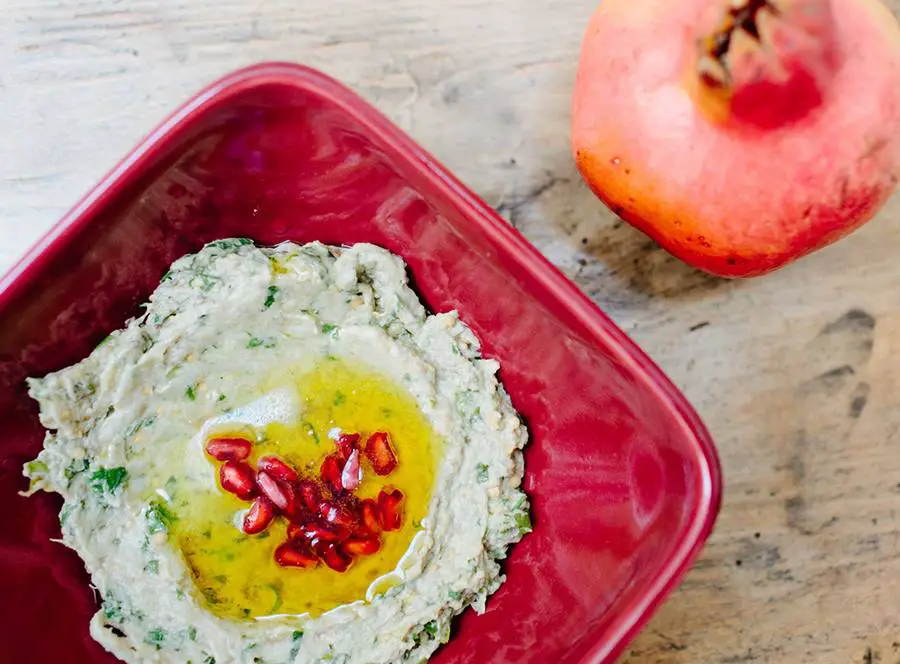
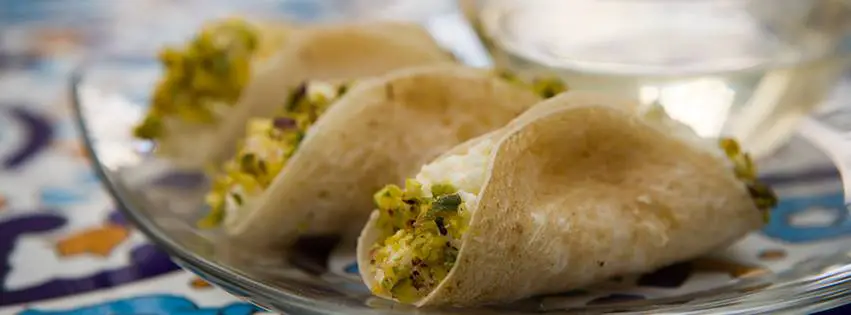
Having moved here after two decades in Asia I love the colour and activity of this street, the grassroots entrepreneurialism and its multi-racial, multi-ethnic character. For me, it’s a model of what a more vibrant Slovenia could be if it looked to the future and took the opportunities that seem to be left on the table for a more interesting, brighter and open life.
The subject of this edition of Meet the People is someone who exemplifies all of the good qualities I see here, and who has turned them into a successful business. It’s Alja Hafner Taha, who runs Libanonske meze in drugi užitki (Lebanese meze and other delights), a very popular restaurant that’s slightly hidden away in a basement, between a building that houses a sex store and another that offers marijuana growing supplies. Walking through the door and down the few steps feels like you’re moving down into another world, an effect aided by the décor, music and – of course – the aromas of a Middle Eastern kitchen, which you’ll have to imagine as you look at the pictures and read my interview with Alja…
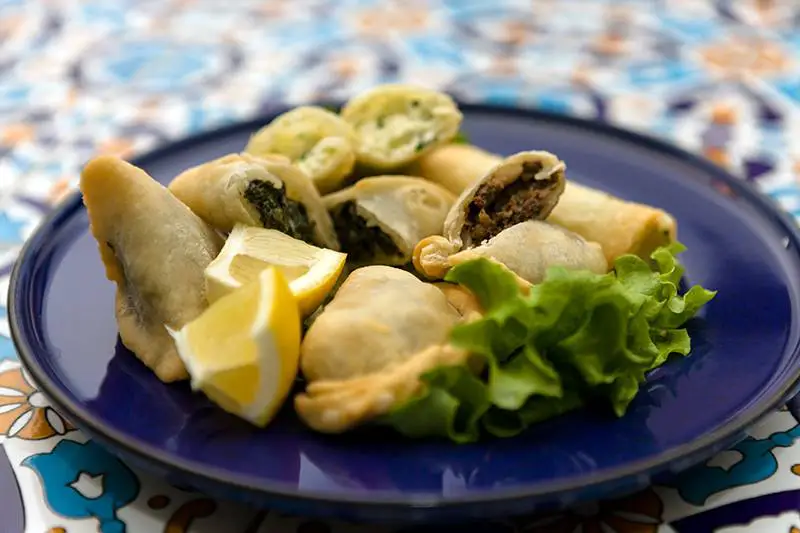
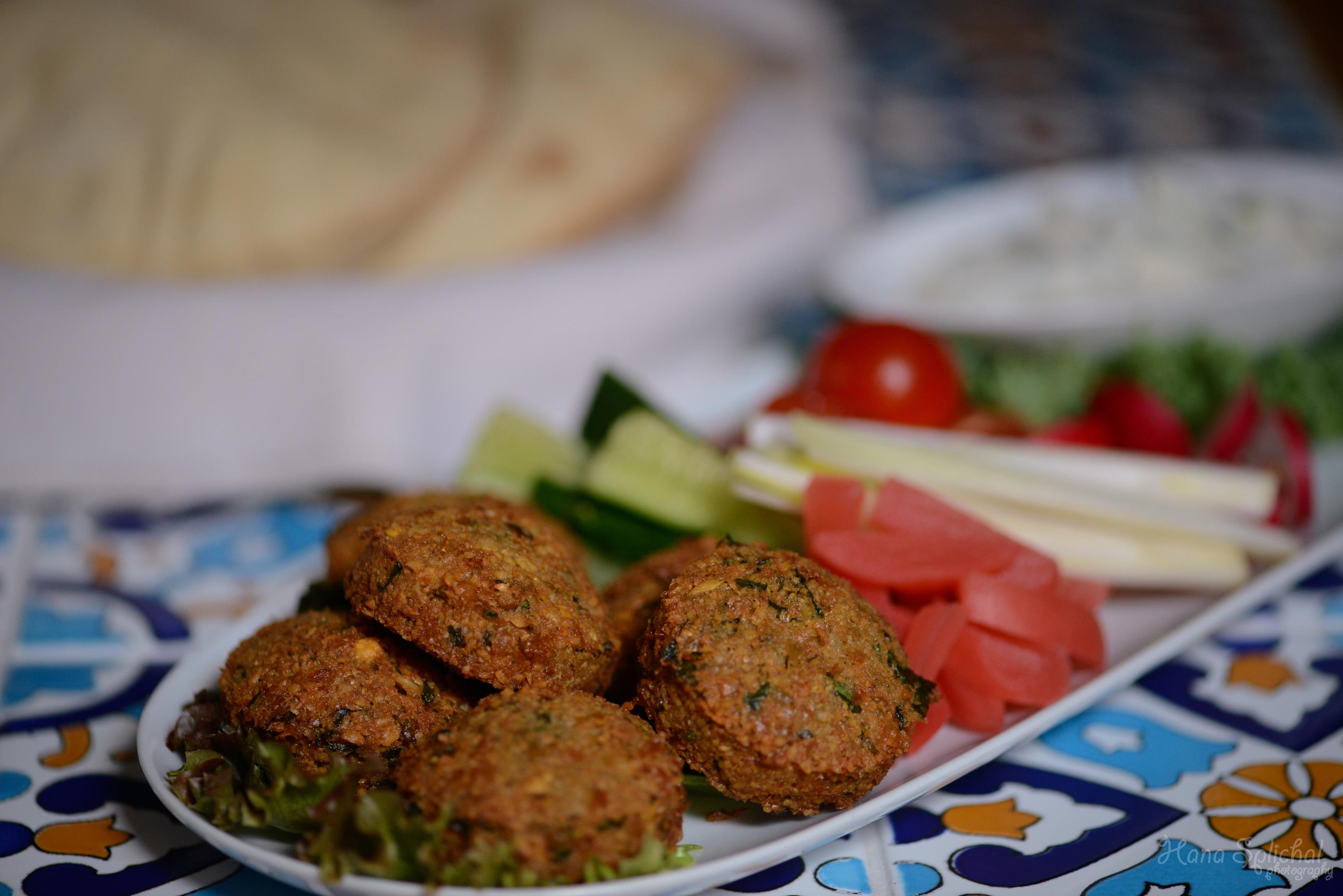
What’s your background?
My father is from Palestine, and he came here to study mechanical engineering in the 60s, then fell in love with a blonde, green-eyed Slovene, my mom, a Slovenian from Trieste.
A couple of years after I was born we left the country, and my dad was an engineer for various foreign companies in Arabic countries, and so for the next decade or so our lives revolved around his work. We started in Algeria, then Iraq, England, then Italy, then to Jordan, and then back here.
I went to eight schools in 11 years,. It’s hard to keep track of it all, but I went to English, French, Italian schools, although in an Arabic environment. I didn’t go to any Arabic school, but my father made sure his children had private lessons in the language.
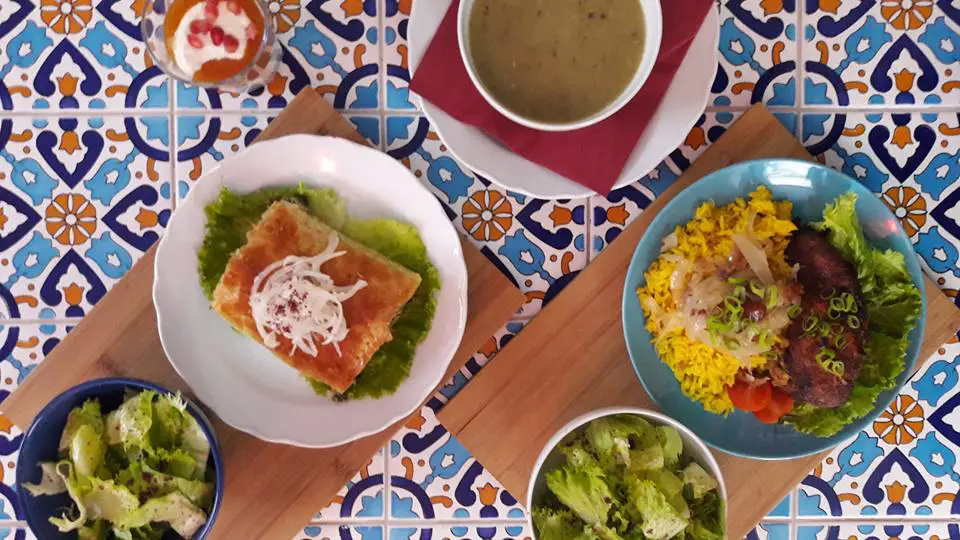
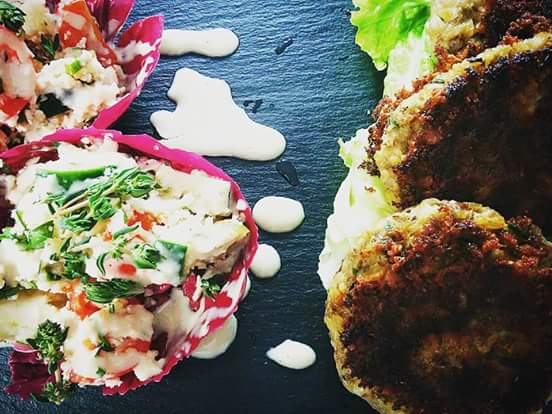
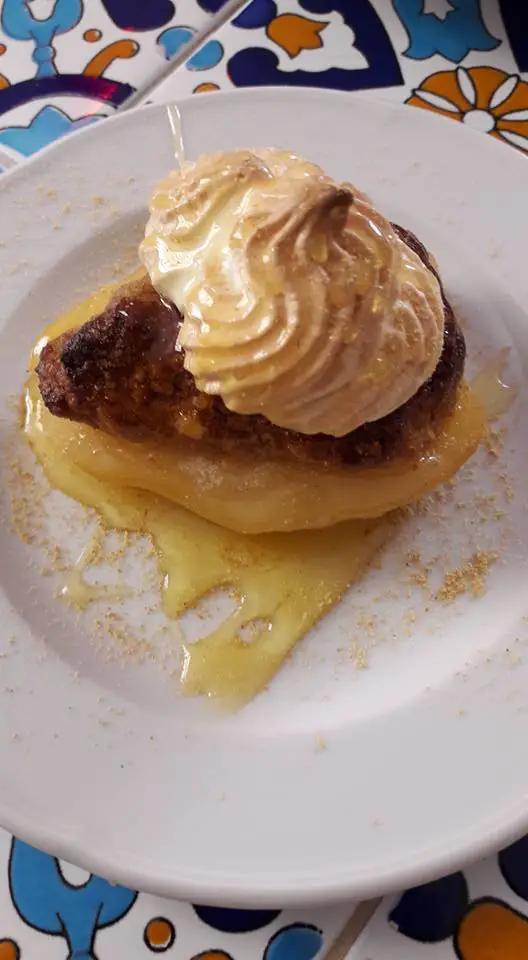
What language did you use at home?
At home I used to speak Slovene with my mom, Arabic with my dad, but since both of them spoke Slovene I eventually switched to that with my father.
How did you end up back in Slovenia?
I studied in Venice, then in the States. When I finished there I got an offer of an internship in America. Now I liked the university system in America - in Italy it was ridiculous, you were left to your own devices, and if you lacked discipline then it just dragged on forever, like in Slovenia –, but I really wanted to come back here for the lifestyle and the culture, which in the States I really didn’t like, and I did that in ‘97
I spent the first couple of years in Koper, then I moved to Ljubljana and worked in marketing, specifically in advertising.
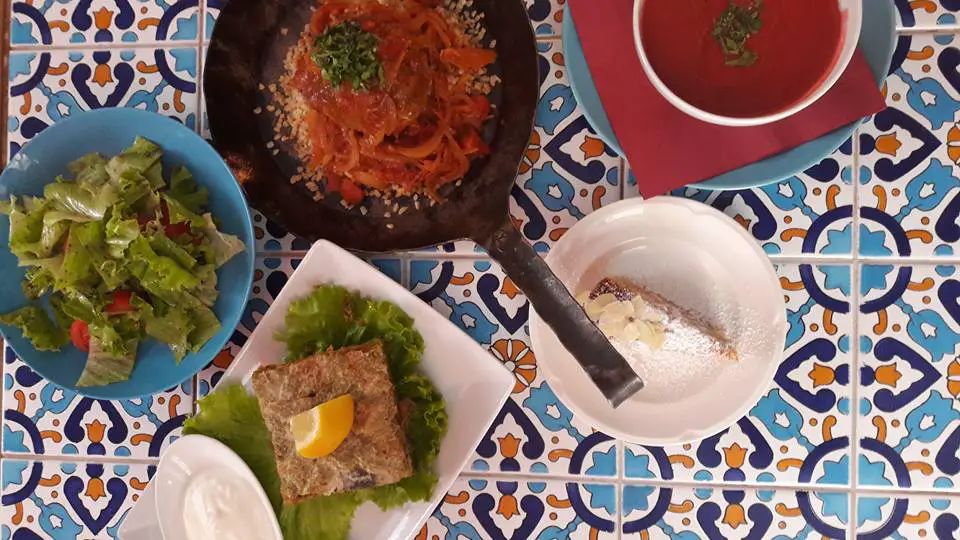
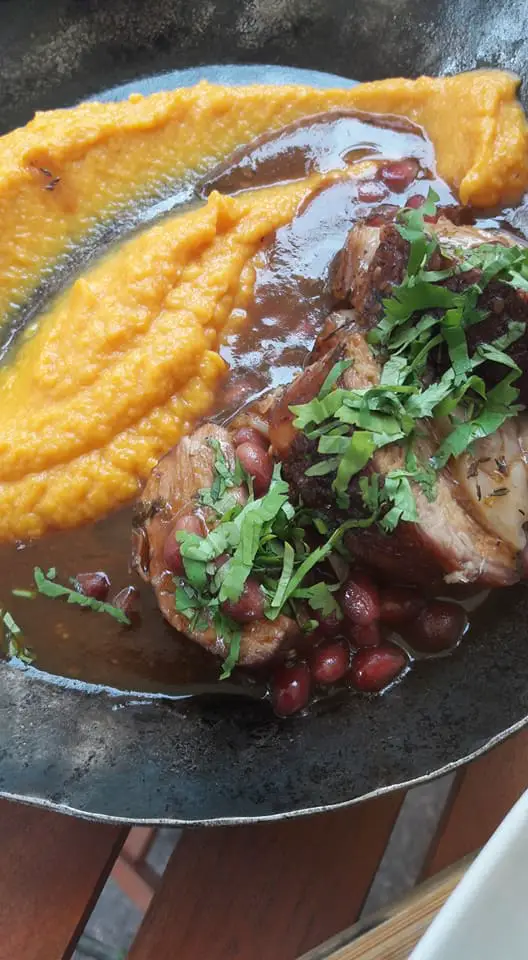
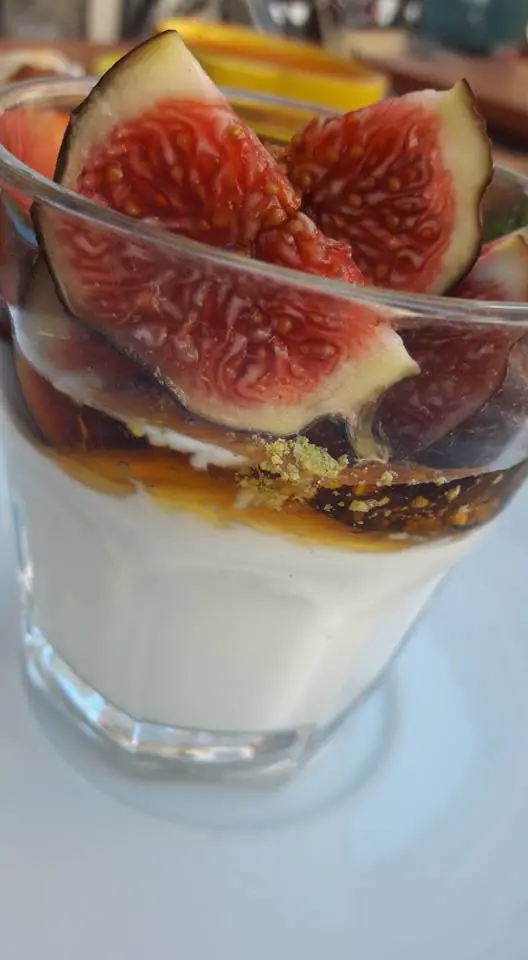
Did your international experience help with that?
I don’t know. The industry in Slovenia is as good as anywhere in Europe, so perhaps not, but certainly my background helped me be more flexible, adaptable, less surprised by things.
So how did you make the move to running a restaurant?
Well, I had a good career, but I wanted a change, and food – the hospitality part if it – was the thing I really felt a passion for. This is something from my upbringing, we always had a full house.
My mother was a great cook, so was my father. When we lived abroad our home was like a hub for dinner parties, garden parties, and I loved it, the whole thing, the preparation and so on, was very fulfilling, emotionally. It was also very eclectic, because we had my mother’s cooking, my father’s cooking, my mother cooking my father’s food, and vice versa, plus all the dishes we picked up on our travels.
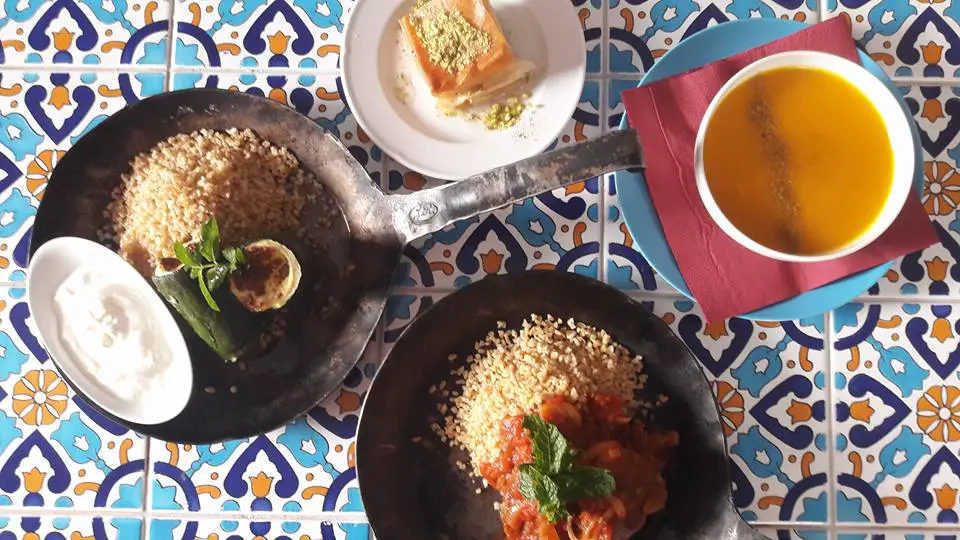
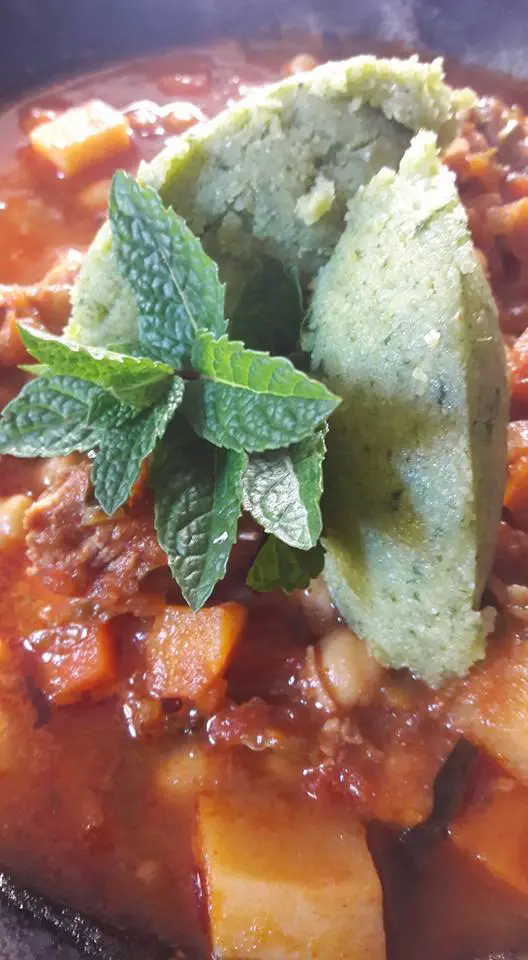
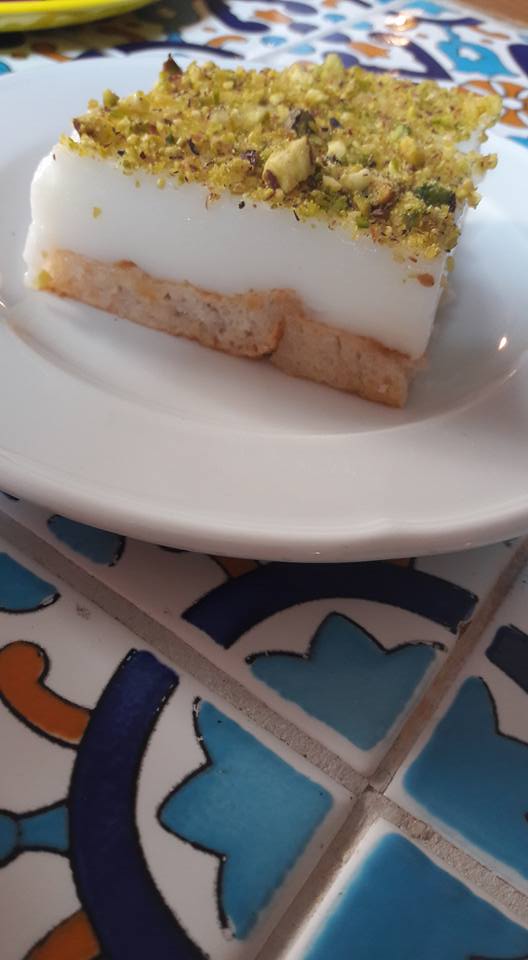
What about your cooking?
I didn’t really start cooking and enjoying it until my mid-20s, but then I really got into it. I’d have, say, 50 people over at my place.
Is it easier to do that with Middle Eastern food?
No, Slovene food’s actually easier to cook for big groups. The food that I cooked then, like the food we cook here, takes a lot of preparation, which is true for most Middle Eastern food. For example, the restaurant opens at 11:30, but work in the kitchen starts at 07:00, because we make nearly everything fresh here, including the pitta bread, every day. We don’t have a lot of space, we don’t have huge refrigerators and freezers to make it all days in advance. We make everything fresh every day, apart from harissa (a chili paste) and makdous, which is small pickled eggplants with walnut, and those are Lebanese, which we get from Vienna.
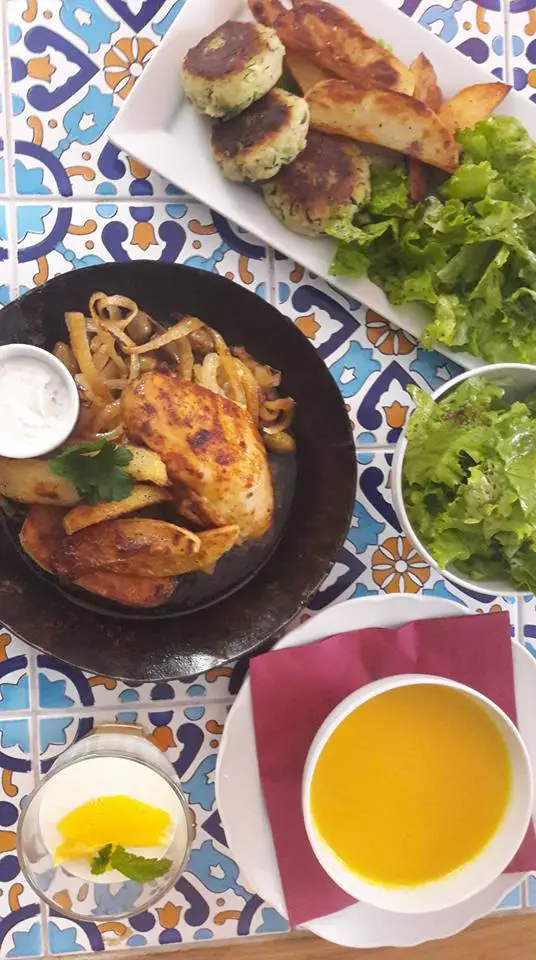
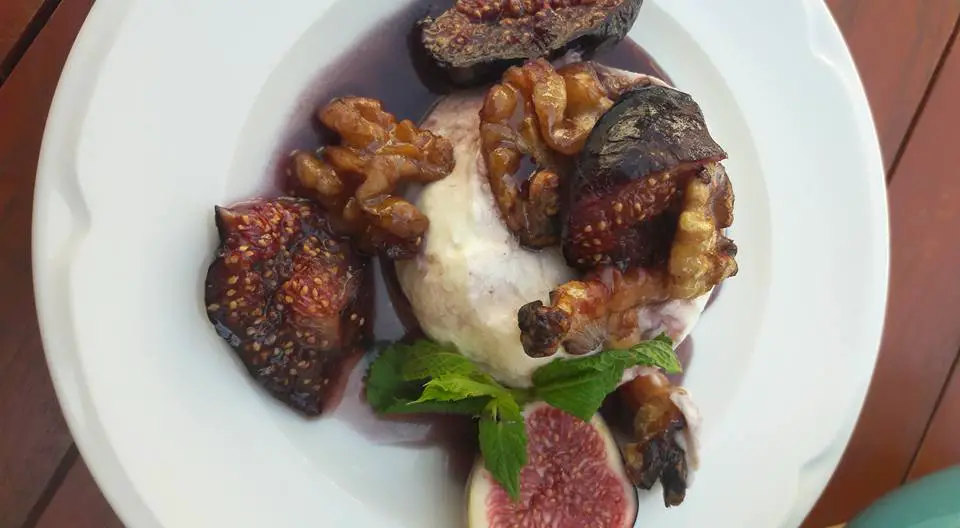
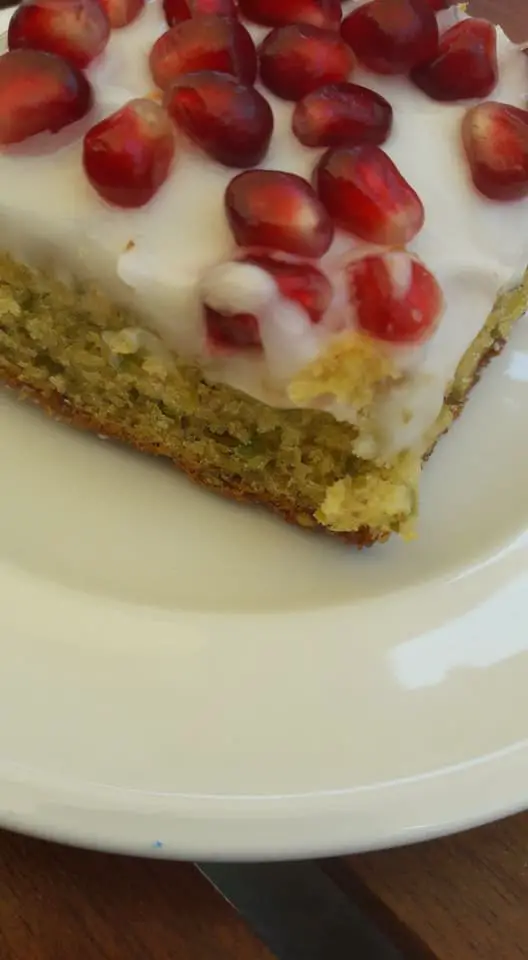
Is sourcing ingredients difficult?
At first it was difficult, but now it’s easy because we have all our contacts. If you want to make it at home you can buy the same stuff in Ljubljana, but if you’re a restaurant you need to get it closer to the source, and get it cheaper. For our vegetables and meat we get those from the market. We have a small scale butcher so we know where it comes from. For things like tahini, makdous, beer and wine we have a Lebanese importer in Vienna.
Authentic Lebanese food in Ljubljana
Do you make many changes to suit local tastes, or is this authentic Lebanese food in Ljubljana?
Being authentic is important to us, but the name Lebanese Meze & Other Delights means we have some room for food that’s not from the Levant. That said, the only things we had to adapt were the level of sourness in some dishes and the amount of garlic, which are both a lot higher in Lebanon. But if we get Lebanese guests we make sure they have a plate of lemons, or if, say, we have Palestinians we put some olive oil on the table.
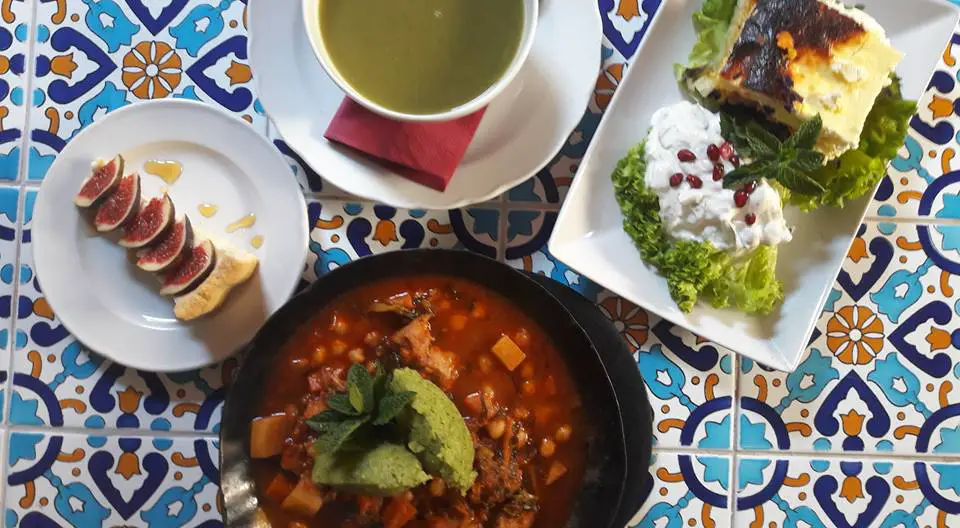
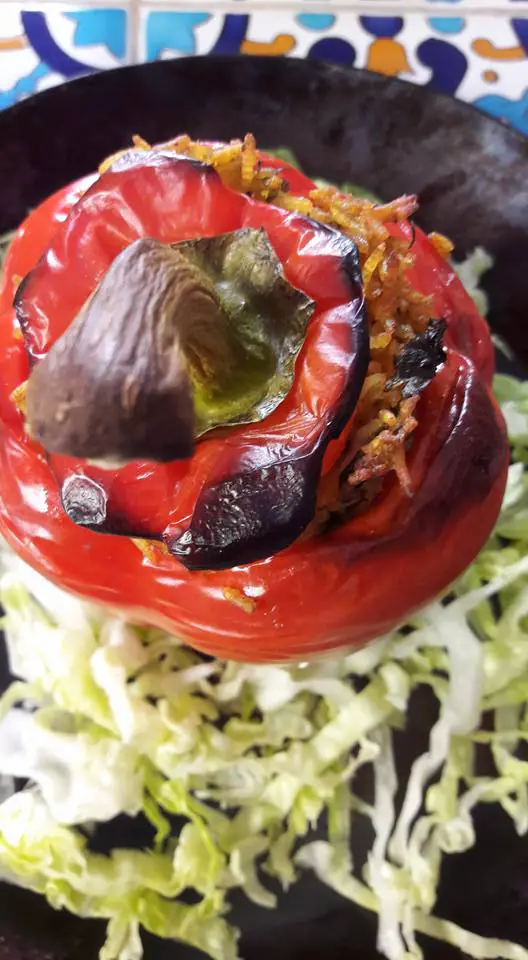
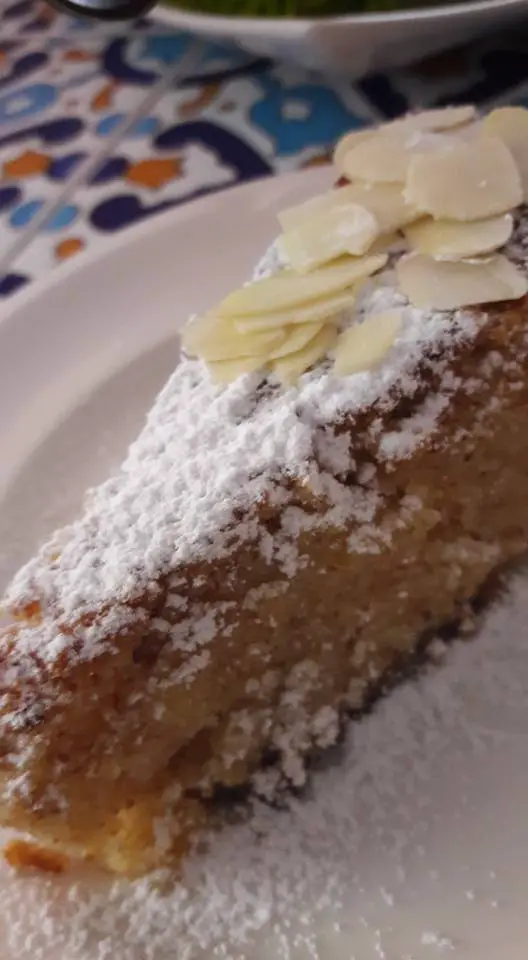
And has the menu changed much over the years?
The menu changes a little with the seasons, but in general it stays the same. Because I’d experimented with this food on friends for years beforehand, I was pretty confident about the dishes were going to have, so I had a strong vision, which is one we still follow.
Did your background in advertising come in useful?
One thing I learned in marketing was that the worst thing you can do is panic and make big changes in direction or the basic concept, plus my background in events management transferred pretty well to the restaurant business. That’s not say it was easy, because I had a lot to learn, but when there were problems or challenges I either had the skills needed to deal with them, or knew people who could help.
But the main problem in running a successful restaurant isn’t anything big, it’s consistency, its doing things extremely well day in day out. And that’s all in the details, not just the food but the way it’s served, the way the place looks, the music that’s played, the cleanliness, the energy that permeates the whole team.
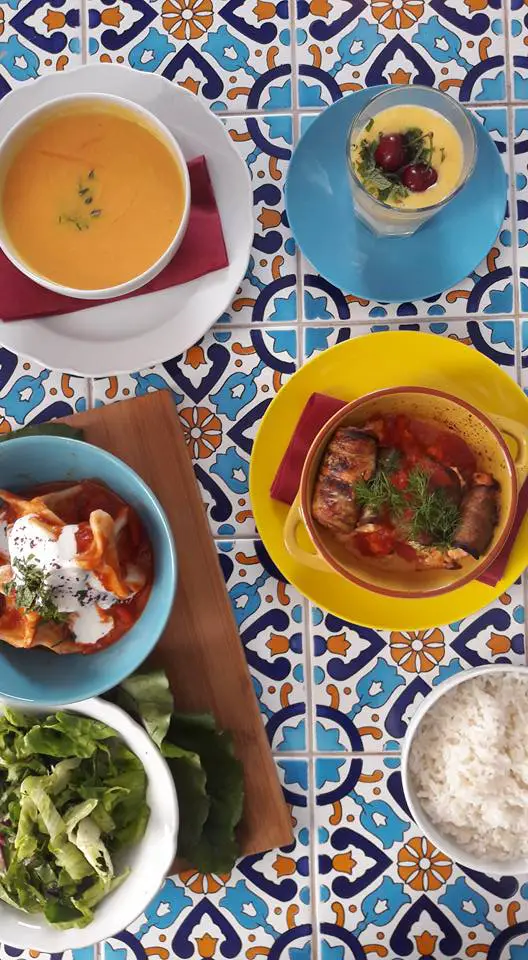
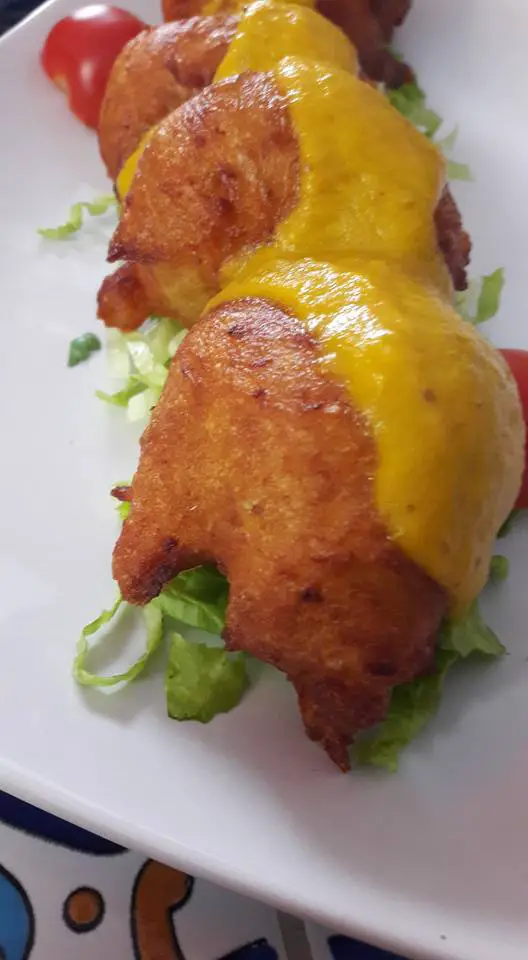
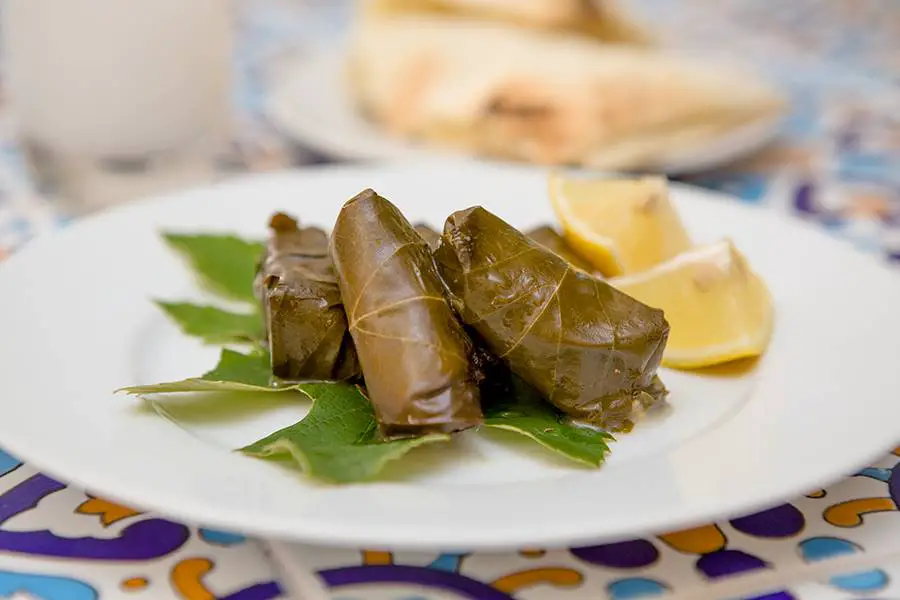
What about the staff here?
We’ve been very lucky with our team. At first we looked at bringing in a cook from abroad, but that involves a lot of paperwork, and is quite risky, because maybe they come here, you help set up a new life, and then they don’t like it. So we got a local guy, a great chef, Matjaž , who’s been here since day one. He manages a staff of Middle Eastern cooks, and the rest of the staff have all been the same for the last year and a half, so they really know what they’re doing. I help out sometimes, when needed, but managing a restaurant and cooking there too is the way to madness, it’s impossible.
Do you have any changes to the menu planned for winter?
Yes, we always change it a little with the seasons, with some heartier food in the winter, but not too much, as there’s always a danger you end up disappointing regulars, which we have a lot of, because you’ve taken a favourite off the menu. Like I said before, quality is paramount, but consistency is the key to success here.
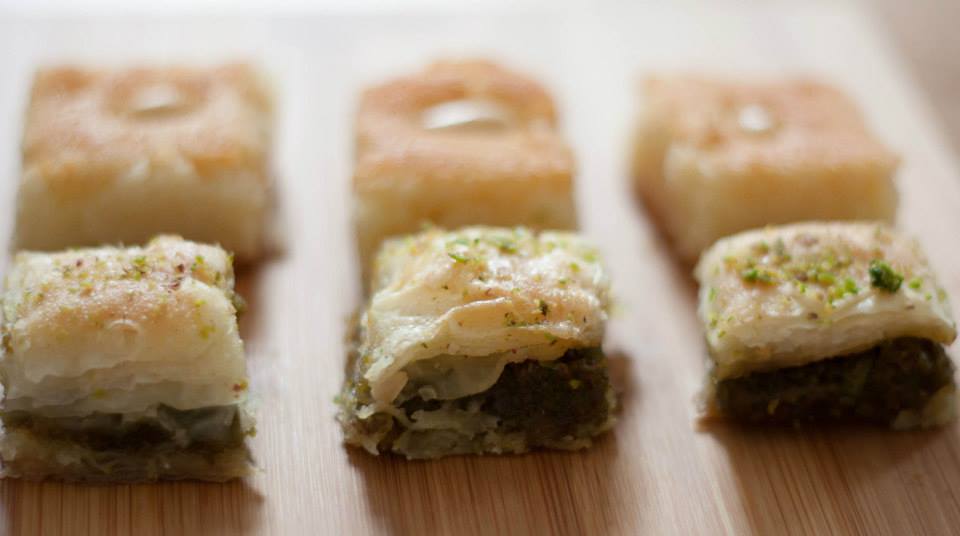
If you’d like to try some of the Lebanese food shown here, which is highly recommended, then you can find Libanonske meze in drugi užitki at 45 Trubarjeva cesta, Ljubljana 1000. The opening hours are Opening hours: Tuesday - Thursday: 11:30 - 22:00; Friday, Saturday: 11:30 - 23:00; Sunday, Monday: Closed. The website is here, while the Facebook is here.
STA, 4 November 2018 - Slovenia is among the least influential countries in the EU, but it is also deeply committed to integration, according to study by European Council on Foreign Relations, a London think-tank.
Slovenia placed alongside Latvia, Malta and Croatia as the country with the least influence on EU policy, with the four countries tied at 25th place among 28 member states.
Slovenia is also 25th along with Bulgaria, Croatia and Malta in terms how influential it is in general in the bloc.
The study, called EU Coalition Explorer, singles out Germany, France, the UK and the Netherlands as the most influential countries overall.
Slovenia ranked high when it comes to fighting for deeper integration, placing 14th and beating the likes of Sweden and Finland.
When it comes to priorities, Slovenia is most active in common asylum policy, single fiscal policy, single market and single eurozone supervision.
Indeed, it is the most vocal advocate of the notion that all member states should be involved in a single fiscal policy.
Overall, Slovenia is of the opinion that the majority of common policies should be shaped by all member states.
It sees Germany as its best partner in policy making, followed by France and Italy.
Slovenia also ranks high, in 16th place, among countries that disappointed the least in the past two years; Hungary is seen as the country that disappointed the most.
The ECFR compiled the survey, which was released earlier this week, based on questions posed to 877 experts from all member states who are active in EU policy, be it in media, government or institutions.
You can find a PDF of the full study here – it’s 1113 pages long




